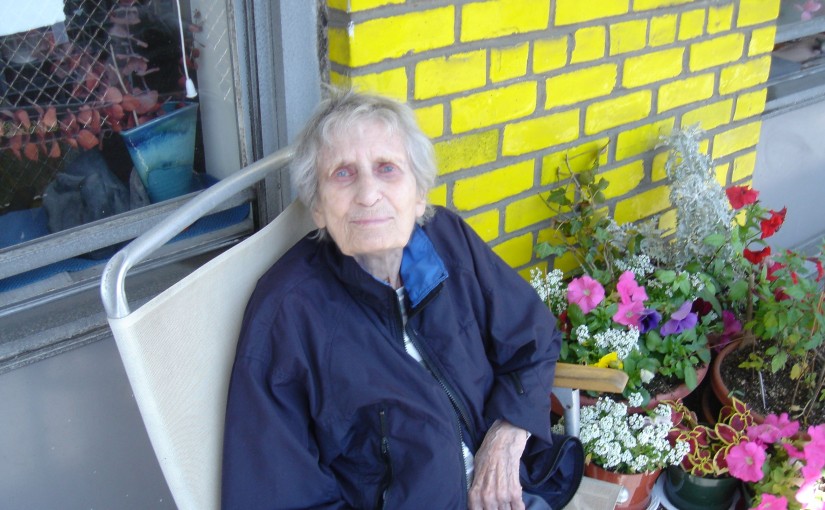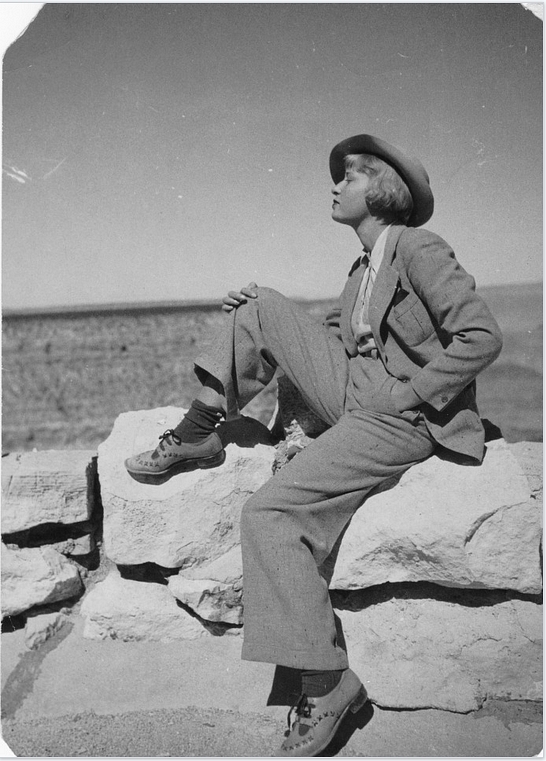 This piece, remarks delivered by Hauser at some public forum I can’t yet identify, convey (according to her son) what she was like in life, quick witted, funny, and impatient with moralizing idiots. This persona definitely comes through in her interviews but here she is engaged with an audience, and explains a fundamental part of her aesthetic: the imagination is capable of inhabiting, and expressing, the experience of others, not just the author. Fiction was her way of knowing things. Without this belief her entire body of work goes away, as she chose only twice to write novels (at least in English) from the point of view of a woman. These are The Talking Room (1976), whose narrator is a 13 year old American girl, pregnant, and being raised by lesbians, and Me and My Mom (1993), a story told by a woman in her 30s (I’m guessing, her age isn’t specified) who puts her old, and increasingly demented mother in a nursing home. Hauser dedicated the book to her old friend and mentor, Coby Gilman, who died in his seventies, alcoholic, and alone. Me and My Mom was published 26 years after his death and burial in a numbered mass grave in Potters Field. She gave this talk in 1984, and refers to the novel she was writing at the time, The Memoirs of the Late Mr. Ashley (1986), which, like Shoot Out With Father (2002) is narrated by a gay man. She discusses both Prince Ishmael (1963) and Dark Dominion (1947) and refers to a book review she wrote for the Times in the early 40s. I am trying find which of the dozens of Times reviews she wrote she is talking about. When I do I’ll post it.
This piece, remarks delivered by Hauser at some public forum I can’t yet identify, convey (according to her son) what she was like in life, quick witted, funny, and impatient with moralizing idiots. This persona definitely comes through in her interviews but here she is engaged with an audience, and explains a fundamental part of her aesthetic: the imagination is capable of inhabiting, and expressing, the experience of others, not just the author. Fiction was her way of knowing things. Without this belief her entire body of work goes away, as she chose only twice to write novels (at least in English) from the point of view of a woman. These are The Talking Room (1976), whose narrator is a 13 year old American girl, pregnant, and being raised by lesbians, and Me and My Mom (1993), a story told by a woman in her 30s (I’m guessing, her age isn’t specified) who puts her old, and increasingly demented mother in a nursing home. Hauser dedicated the book to her old friend and mentor, Coby Gilman, who died in his seventies, alcoholic, and alone. Me and My Mom was published 26 years after his death and burial in a numbered mass grave in Potters Field. She gave this talk in 1984, and refers to the novel she was writing at the time, The Memoirs of the Late Mr. Ashley (1986), which, like Shoot Out With Father (2002) is narrated by a gay man. She discusses both Prince Ishmael (1963) and Dark Dominion (1947) and refers to a book review she wrote for the Times in the early 40s. I am trying find which of the dozens of Times reviews she wrote she is talking about. When I do I’ll post it.
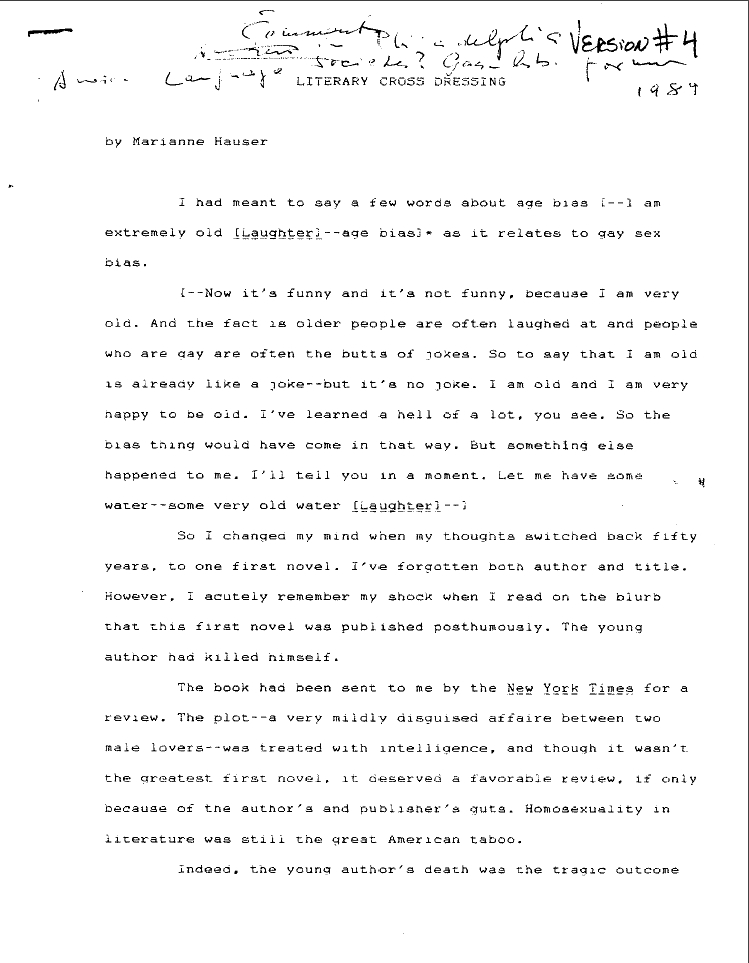
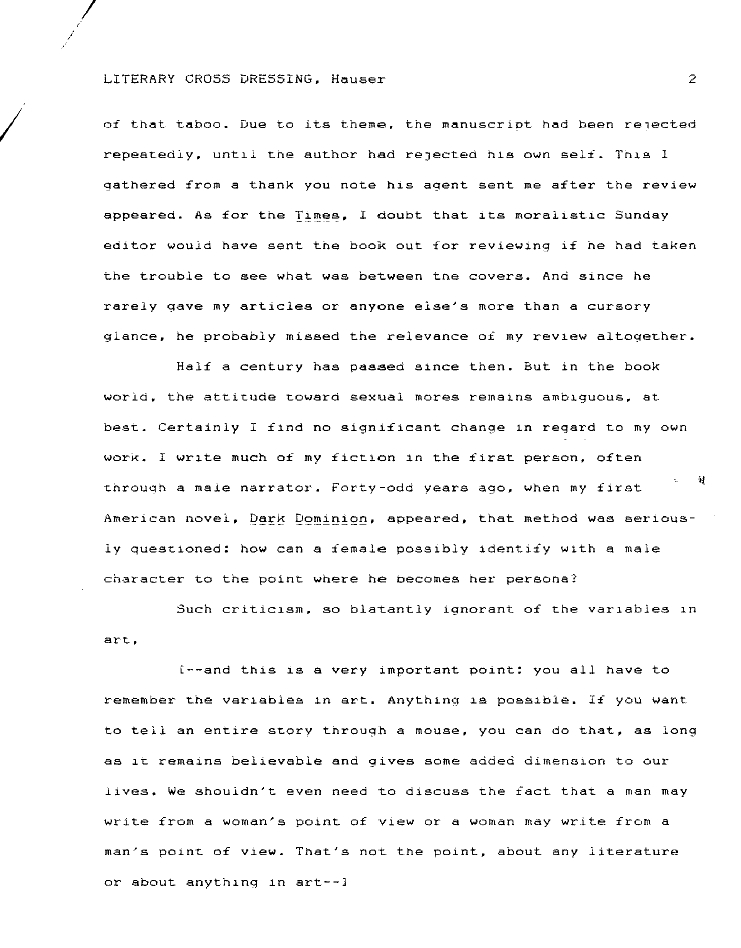
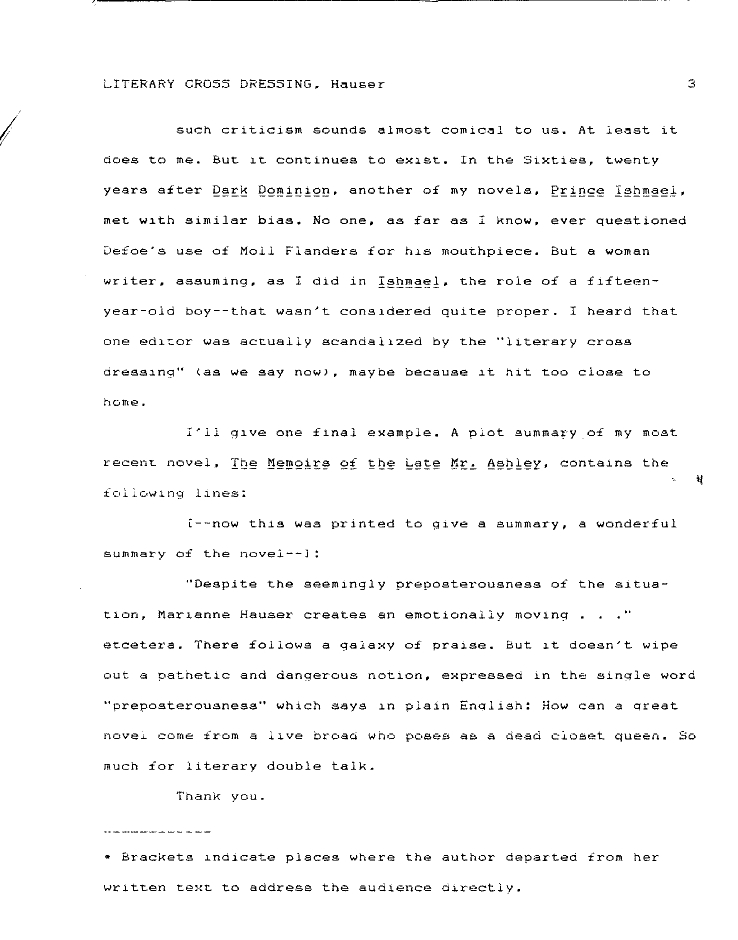
Published by

Jon Frankel
This website is dedicated to the life and career of novelist Marianne Hauser (1910-2006). Marianne Hauser wrote 9 novels, and dozens of short stories. Her first novel, Monique, was published in German when she was 22 and living in Paris. Her last novel, Shootout with Father, was published by FC2 in 2002, when she was 91. She moved to New York in 1937 after traveling through Asia and North Africa alone, as a reporter. Only three of her works remain in print today: The Talking Room, her best known work, a brilliant, subversive and hilarious novel about a pregnant 13 year old being raised by warring lesbian parents, published by the Fiction Collective in 1976, Shootout with Father, and The Collected Short Fiction of Marianne Hauser (2004). These books are available from FC2. Her other American books, Dark Dominion (1947), The Choir Invisible (1958), Prince Ishmael (1963), A Lesson in Music (1964), The Late Memoirs of Mr. Ashley (1986), and Me & My Mom (1993), are out of print but easy to find used and in libraries.
This is a collaborative project. Its purpose is to promote her work and make available to interested readers as much information as I can unearth about her. In Hauser's long life she made many professional and personal friends. Her agent was Perry Knowlton and her first book was published by Bennett Cerf six years after she took him to task over Gertrude Stein in her New York Times review of Ida. In 1963 Prince Ishmael was nominated for a Pulitzer Prize, and was a New York Times notable book of the year. From the 1970s through to 2004 her writing was published and reviewed by different incarnations of the Fiction Collective and Sun & Moon Press. She wrote reviews for the American Book Review and appeared in journals like Fiction International, Blatant Artifice, Witness.
If you knew her or are studying her work I welcome contributions, memoirs, interviews, letters, analyses, what have you. Since at least the seventies writers have lamented that she is not better known. Many people have tried to bring her greater recognition: Alice S. Morris, Anais Nin, Marguerite Young, the writers at the Fiction Collective, Larry McCaffery, Sinda Gregory, Douglas Messerli, Margot Mifflin, Ed Cardoni, and Professor Andrea L. Harris, among others. Just about everyone who has written about her has wondered why her work is neglected. Hauser cared little for self-promotion and was impatient with compromise. She was an anti-authoritarian enchantress, intelligent, intuitive, playful, and genuine. She wrote every day on a small manual Olivetti typewriter and tirelessly revised. She was passionate about politics and art. Friends called her Bear. Her final work, Little Buttercup, written for her granddaughter, is subtitled, the happiest bear in the world.
View all posts by Jon Frankel
 This piece, remarks delivered by Hauser at some public forum I can’t yet identify, convey (according to her son) what she was like in life, quick witted, funny, and impatient with moralizing idiots. This persona definitely comes through in her interviews but here she is engaged with an audience, and explains a fundamental part of her aesthetic: the imagination is capable of inhabiting, and expressing, the experience of others, not just the author. Fiction was her way of knowing things. Without this belief her entire body of work goes away, as she chose only twice to write novels (at least in English) from the point of view of a woman. These are The Talking Room (1976), whose narrator is a 13 year old American girl, pregnant, and being raised by lesbians, and Me and My Mom (1993), a story told by a woman in her 30s (I’m guessing, her age isn’t specified) who puts her old, and increasingly demented mother in a nursing home. Hauser dedicated the book to her old friend and mentor, Coby Gilman, who died in his seventies, alcoholic, and alone. Me and My Mom was published 26 years after his death and burial in a numbered mass grave in Potters Field. She gave this talk in 1984, and refers to the novel she was writing at the time, The Memoirs of the Late Mr. Ashley (1986), which, like Shoot Out With Father (2002) is narrated by a gay man. She discusses both Prince Ishmael (1963) and Dark Dominion (1947) and refers to a book review she wrote for the Times in the early 40s. I am trying find which of the dozens of Times reviews she wrote she is talking about. When I do I’ll post it.
This piece, remarks delivered by Hauser at some public forum I can’t yet identify, convey (according to her son) what she was like in life, quick witted, funny, and impatient with moralizing idiots. This persona definitely comes through in her interviews but here she is engaged with an audience, and explains a fundamental part of her aesthetic: the imagination is capable of inhabiting, and expressing, the experience of others, not just the author. Fiction was her way of knowing things. Without this belief her entire body of work goes away, as she chose only twice to write novels (at least in English) from the point of view of a woman. These are The Talking Room (1976), whose narrator is a 13 year old American girl, pregnant, and being raised by lesbians, and Me and My Mom (1993), a story told by a woman in her 30s (I’m guessing, her age isn’t specified) who puts her old, and increasingly demented mother in a nursing home. Hauser dedicated the book to her old friend and mentor, Coby Gilman, who died in his seventies, alcoholic, and alone. Me and My Mom was published 26 years after his death and burial in a numbered mass grave in Potters Field. She gave this talk in 1984, and refers to the novel she was writing at the time, The Memoirs of the Late Mr. Ashley (1986), which, like Shoot Out With Father (2002) is narrated by a gay man. She discusses both Prince Ishmael (1963) and Dark Dominion (1947) and refers to a book review she wrote for the Times in the early 40s. I am trying find which of the dozens of Times reviews she wrote she is talking about. When I do I’ll post it.


